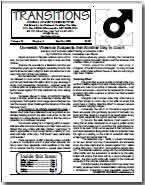
National Coalition For Men (NCFM)
NOTE: NCFM, in a sidebar, is shown as a notable activist Men’s Movement organization along with Fathers 4 Justice and Save the Indian Family Foundation in India. Aside from which this is one of the better articles about our issues and the ever expanding forms of discrimination against men.
BBC Magazine
Just who are men’s rights activists?
By Tom de Castella BBC News MagazineAn increasingly vocal men’s movement argues that anti-male discrimination is rife. Who are the activists and what do they want?
Feminists have spent decades trying to get equal pay and rights for women.
But while, in the West at least, discrimination against women is rigorously challenged, a growing band of men’s rights activists say no such protection is afforded to men.
Many of these activists also believe that the media allow women to objectify and ridicule men in a way that would be unthinkable if the gender roles were reversed.
A new book argues that on a whole range of fronts – from government, the courts and schools – men are being discriminated against.
David Benatar, head of philosophy at the University of Cape Town, argues in his polemic The Second Sexism that across the world men are more likely to be conscripted into the military, be victims of violence, lose custody of their children, and take their own lives.
Custody law is perhaps the best-known area of men’s rights activism, with images of divorced fathers scaling buildings in Batman suits familiar in the UK.
Benatar asserts that in most parts of the world custody rights cases are stacked firmly against men. “When the man is the primary care-giver his chances of winning custody are lower than when the woman is the primary care-giver.
“Even when the case is not contested by the mother, he’s still not as likely to get custody as when the woman’s claim is uncontested.”
Education is another area where men are falling behind, the activists note. Tests in 2009 by the Programme for International Student Assessment showed that boys lagged a year behind girls at reading in every industrialised country. And women now make up the majority of undergraduates, Benatar says.
“When women are underrepresented as CEOs of companies that is deemed discrimination. But when boys are falling behind at school, when 90% of people in prison are male, there’s never any thought given to whether men are discriminated against.”
If sexual equality is to be achieved then male discrimination must be taken as seriously as sexism against women, he argues.
Equal pay is the barometer in developed countries like the UK. According to the Office for National Statistics, the gender pay gap is still pronounced within professions. Women earn on average £8,000 less than a man as lawyers, £14,000 less as a CEO and £9,000 less as a doctor.
But the picture may be changing. Last year the the Universities and Colleges Admission Service discovered that women aged 22-29 have overtaken men on pay for the first time. And a survey for the Chartered Management Institute found that female managers in their 20s were earning 2.1% more than their male counterparts.
Such controversies are feeding a sense that men need to set up their own support structures. The Men’s Network, a charity in Brighton, aims to help “every man and boy in our city to fulfil his greatest potential”.
Movember, a campaign in which men grow facial hair for a month, taps into a feeling among some men that male diseases like prostate and testicular cancer are not taken as seriously as women’s.
As the old certainties break down, a masculinist movement claims men need their own equivalent to feminists.
Aoirthoir An Broc, founder of the International Association of Masculinists, says there are thousands of male activists in India fighting the country’s unequal divorce laws.
An Broc, a web designer in Cleveland, Ohio, is planning to set up the first domestic violence shelter in the US for male victims. He says there’s an assumption that women are always innocent and men the aggressor. In response he’s coined the term “all men are good” to counter the negative perception.
“We say that all men are men, all men are good, all men are worthy of love and respect regardless of race, sexuality, religion. We don’t believe in cultural definitions of men.”
There’s a cultural context, too. Some of the men’s rights-type concerns echo those of feminists – male body image is a growing issue.
And there are some who feel that while feminism has addressed discrimination against women, outdated attitudes towards men have not been tackled.
Tom Martin gained attention last year after suing the London School of Economics’ gender studies department for sexism.
He says he was radicalised while working as a barman in a club in Soho. “I could see that male customers were being abused at every point,” he says.
Men had to queue and often pay while women got in free. They were goaded by bouncers to leave, while women were treated with respect. But worst of all, he believes they were used by women to buy drinks.
But Martin says it is all about sex.
“Since the pill, women have been told they can and should be having orgasms. And because they haven’t been, they categorise that as men’s fault.”
He concludes that “it’s women’s job to make themselves sexually happy, it’s not a man’s burden.”
The psychologist Oliver James believes men are feeling “sexually threatened”.
Women are no longer reticent about sex or their expectations from a lover. Furthermore they are now more likely to evaluate a man’s sexual performance in public and even deride men who “aren’t particularly imaginative or clever” in bed, he argues.
For feminists the men’s movement is more straightforward. “It’s the same old point that feminism has gone too far,” says Mail on Sunday columnist Suzanne Moore.
The continuing gender pay gap and the fact that men dominate senior positions in public life, show up where the real discrimination is, she argues. There are problems with the way boys are educated but “you can’t make sweeping statements about all men being discriminated against”, she says.
Kat Banyard, author of The Equality Illusion, says men make the mistake of fearing feminism when it offers them liberation from an outdated masculinity. “There’s a belief that feminism is a zero sum game and that men are losing.”
To argue that men are now the victims of the gender struggle is absurd, she says. “For thousands of years women were subjugated as second class citizens. We’ve just started to change that in the last two centuries and there’s a long way to go. The men’s activists are denying history.”
Male rights campaigners have struggled to shed their “cranky” image, argues Tim Samuels, presenter of BBC Radio 5 live’s Men’s Hour.
Most men don’t see themselves as part of a movement, Samuels says. But they do want to talk to each other with a greater emotional complexity than previous generations of men – “even if it’s not like Oprah”.
And whatever one thinks about the spectrum of men’s rights activism, there are important issues, like the fact that young men are three times as likely to die by suicide as young women.
“The men’s movement tends to be dismissed as blokes scaling buildings dressed as superman. Whereas the women’s movement is given credibility,” Samuels says.



